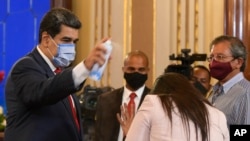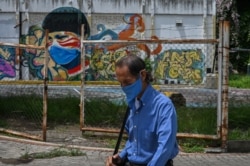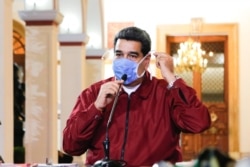On January 24, Venezuelan President Nicolas Maduro announced Venezuela had created a new medicine he claims is 100% effective in combating COVID-19.
He called the medicine “the miracle drops of Jose Gregorio Hernandez,” a renowned Venezuelan doctor who died in 1919 and was beatified by Pope Francis in June 2020.
"Having received the official health permit of the country, I can present the medicine that 100 percent neutralizes the coronavirus — Carvativir,” Maduro said.
He said the medicine had been developed over nine months and tested on patients in a Caracas hospital and a makeshift medical facility set up at a sports center.
Maduro claimed Carvativir had no side effects and was being prepared for a nationwide rollout.
"Ten drops under the tongue, every four hours, and the miracle is done. It’s a powerful antivirus medication. It’s so powerful that it neutralizes the coronavirus,” Maduro said.
Maduro’s claim that Carvativir “neutralizes” SARS-CoV-2, the virus that caused the COVID-19 pandemic, is unsubstantiated. Little is known about the “miracle cure,” as no peer-reviewed data on it has been made available.
Writing on Twitter, Dr. Francisco Marty, a Boston infectious disease specialist, posited Carvativir “is the proposed brand name of isothymol for treatment of COVID-19, posted online by the Laboratorio Farmacológico de Venezuela.”
He noted that the bottle itself labels isothymol as the active ingredient at a concentration of 5mg/mL.
A May 2020 “in silico” or computer simulation study theorized that isothymol could potentially be used to prevent SARS-CoV-2 infection. That study, available on the PubMed web site, looked at isothymol derived from the essential oil of the aromatic and medicinal plant Ammoides verticillata.
Marty wrote on Twitter that Maduro’s claims regarding Carvativir are “unsubstantiated by any clinical data.” He added that the Venezuelan president’s press conference appeared to be more about generating public approval than providing a vetted treatment.
Venezuela’s National Academy of Sciences described the drug somewhat differently. The academy said Carvativir is “supposed to be a derivative of Thyme,” whose “nutritional and therapeutic agents” have been known since “ancient times.”
Although the academy said thyme extracts have “therapeutic potential against coronavirus,” it added that it would be prudent to wait for more data on Carvativir tests, conducted in accordance with international protocols needed “to qualify as a candidate for an anti-COVID-19 drug.”
Meanwhile, the president of the Venezuelan Society of Infectious Diseases, María Graciela López, recently told Argentina-based Infobae that no scientific evidence had been presented on the viability of Carvativir.
“We have no information that it has gone through Phases 1, 2, and 3 [clinical trials], that it has been published in peer-reviewed scientific journals or been subjected to peer review by researchers who are outside the development of the product, thus validating the scientific weight of the information that is being given,” López said.
Maduro stated that all the available information will “be published in international magazines.”
However, as Polygraph.info previously reported, in a regular drug approval process, the scientific evaluation and assessment of efficiency, safety, potential flaws, and side effects can take years. Medicines and vaccines are developed through a three-phase process, with comprehensive, peer-reviewed studies published in medical journals at each phase.
With the pandemic death toll rising, the World Health Organization allowed manufacturers to accelerate the study and assessment stage and expedite vaccine rollouts right after final clinical trials.
Some two dozen countries began vaccinations in mid-December, and more than 32 million people globally received doses of one of the several vaccine versions available by mid-January, according to the tracking site Our World in Data.
For example, while Russia had faced criticism for fast-tracking its Sputnik V COVID-19 vaccine, the results of Sputnik V phase 1 and phase 2 trials have been published in the British medical journal Lancet. Preliminary data has been released on phase 3 trials, which is set to run until May.
Other vaccines, including Pfizer’s and Moderna’s, completed phase three trials, each covering tens of thousands of participants.
This is not the first time Maduro has made an unsubstantiated COVID-19 treatment claim.
In October, Maduro said Venezuelan scientists had isolated the molecule DR10, which he similarly claimed killed 100 percent of the coronavirus with no side effects.
Maduro said their findings on DR10, a derivative of ursolic acid, which has previously been used to treat diseases like Hepatitis C, had been presented to the World Health Organization (WHO) and the Pan American Health Organization (PAHO).
At the time, PAHO confirmed to Polygraph.info that the Venezuelan health ministry reached out about studying DR-10.
“This is the first step in the process of investigating a molecule that can, in the future, be used as a medicine,” the organization said. “PAHO is providing the necessary information to the Ministry to proceed with all the required steps."
Around the same time, Maduro claimed that Facebook had censored several publications concerning the DR10 molecule, the Russian state-funded broadcaster Sputnik reported.
Maduro said Facebook had deleted three publications from his Facebook account, including a broadcast where he “scientifically explained the steps” Venezuela had purportedly taken to isolate DR10.
Venezuelan Congressman and Presidential Commissioner for Health and Health Care for Migrants, José Manuel Olivares said it had been irresponsible for Maduro to say Venezuela had found a cure for COVID-19.
He likewise noted DR10 had not gone through the rigorous drug approval process.
“We have to see in what [form] it can be offered, if it is toxic … It is a process that takes time, money, and research. Once this phase is over, animal studies are [done] to see if it is safe and effective, and then it is tested on a small group of people… There is recognition of Venezuelan medicine, but also political and cheap manipulation to make us believe there is a cure,” he said in October.
Olivares said Maduro had previously touted equine plasma serum and lemon grass drops as “miraculous” COVID-19 cures, despite the fact that they were unsupported by science.
According to tracking by Johns Hopkins University & Medicine, Venezuela has reported more than 125,000 cases of COVID-19 and nearly 1,200 deaths. The true numbers are likely higher.







